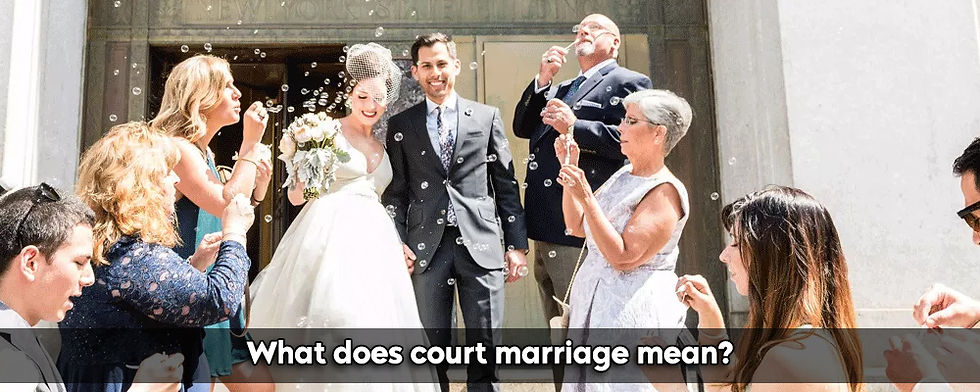What Does Court Marriage Mean?
- Sep 12, 2023
- 4 min read
The idea of marriage has changed greatly in modern society. The possibility of a court marriage is one of the most notable modifications to the institution of marriage. A legal connection between two people recognized by the government without using any religious or ceremonial ceremonies is known as a court marriage, also known as a civil marriage or statutory marriage.
Meaning of Court Marriage
In its most basic form, a court marriage is an adult consenting union that is performed often in a court of law or a government office. Since there are no religious rites, customs, or ceremonies involved, it differs from typical religious or cultural ceremonies. Instead, it constitutes a purely civil contract that the government has approved.
Court marriages are accepted and subject to the laws of the nation or state in which they occur. To establish their legal marital status, the couple receives a marriage certificate.
Step-by-Step Procedure of Court Marriage
Verify your eligibility before beginning the court marriage procedure to make sure you and your partner match the requirements established by your local authorities. These standards often consist of-
Both partners must be at least 18 years old, which is considered to be of legal age. With parental approval or a court order, marriage at a younger age may be permitted in some jurisdictions.
Both parties must be in good mental health and be able to comprehend the ramifications of marriage. A medical certificate may be required by the court in circumstances of mental incompetence.
Verify that you and your companion are legitimately unmarried, divorced, or widowed. If applicable, divorce judgments or death certificates may be required.
Speak with your neighbourhood marriage registry office or the appropriate government agency in charge of court marriages. A written notice of your intention to marry must be submitted. Typically, this notice will state-
Fill out the court marriage application form as directed. Names, residences, dates of birth, and details about your parents are among the private information requested on this form.
Hand out legitimate identification documents that include passports, licenses, or voter registration cards.
Present proof of your age, including a birth certificate or a diploma from a school.
Submit documentation of your address, such as electricity or water bills or agreements for rentals.
Typically, you must include a couple of passport-sized photos with your application.
The notice of intention to marry may be made public in some jurisdictions to allow for public objections. This procedure is designed to make sure that the marriage does not contravene any laws or other legal requirements.
Following the notice of intent submission, there may be a required waiting time that is typically 30 days long. The marriage registrar examines the application during this time and answers any concerns that may have been voiced. This waiting period enables the marriage's eligibility and legality to be confirmed.
The marriage registrar is going to examine the supplied papers to make sure they comply with all applicable laws. The registrar will start the marriage process if there are no protests and everything is in order.
Following the completion of the waiting time and the verification of all paperwork, the couple may publicly make a declaration of their intention to get married in front of the marriage registrar. The couple's parents or legal guardians may be present as witnesses when this statement is made, as is customary.
After the process of waiting and verification are through, the court marriage is actually solemnized. The following are the steps that make up this process-
In most cases, the marriage must be solemnized in the presence of at least two witnesses. These witnesses frequently also take part in the declaration of intent.
The marriage registrar officiates at the legal ceremony by reading the marriage's legal requirements. To formally consummate the marriage, the couple and witnesses all sign the marriage license.
The marriage registrar produces a marriage certificate following the event. This certificate is a crucial document for a number of legal purposes and acts as legal documentation of your marriage.
You might have to register your marriage individually with the local government or a marriage registration office in some jurisdictions. Make sure you adhere to any additional registration guidelines that are unique to your region.
If you need the help of lawyers for your court marriage in Chandigarh, then court marriage lawyers in Chandigarh can be hired. If you need the help of lawyers for your court marriage in Faridabad, then court marriage lawyers in Faridabad can be hired. If you need the help of lawyers for your court marriage in Ghaziabad, then court marriage lawyers in Ghaziabad can be hired. If you need the help of lawyers for your court marriage in Gurgaon, then court marriage lawyers in Gurgaon can be hired. Similarly, court marriage lawyers in Delhi can be hired to solemnize your court marriage in Delhi.
One can talk to a lawyer at Lead India for legal assistance. Free legal advice online can be obtainable at Lead India . Along with obtaining free legal advice online, one can also ask a legal question to the experts online free from Lead India.
SOURCE:-
Visit us: https://www.leadindia.law
Call Us: +91–8800788535
Email: care@leadindia.law
Facebook: https://www.facebook.com/leadindialaw
Twitter: https://twitter.com/leadindialaw
Pinterest: https://in.pinterest.com/lawleadindia




Comments